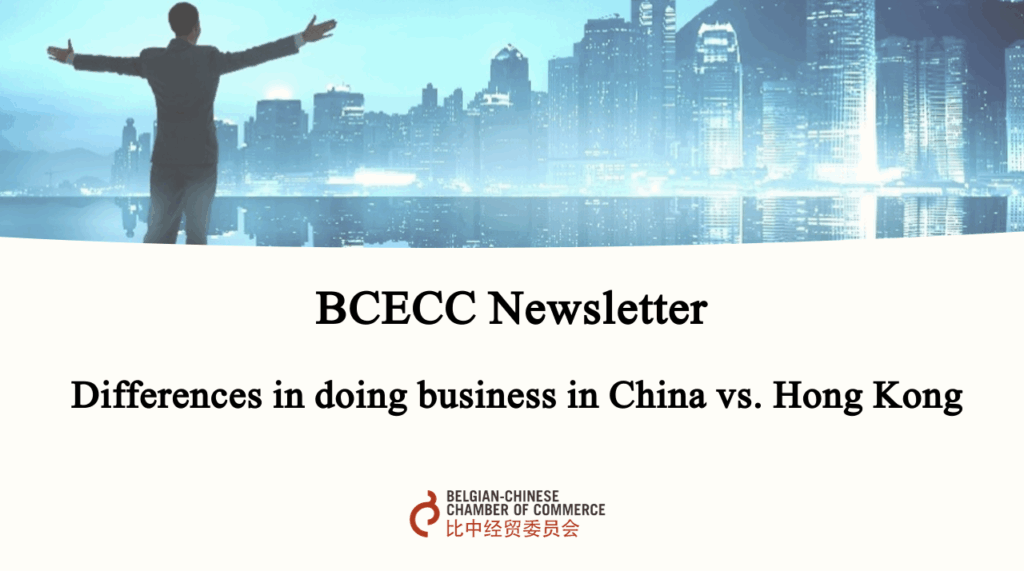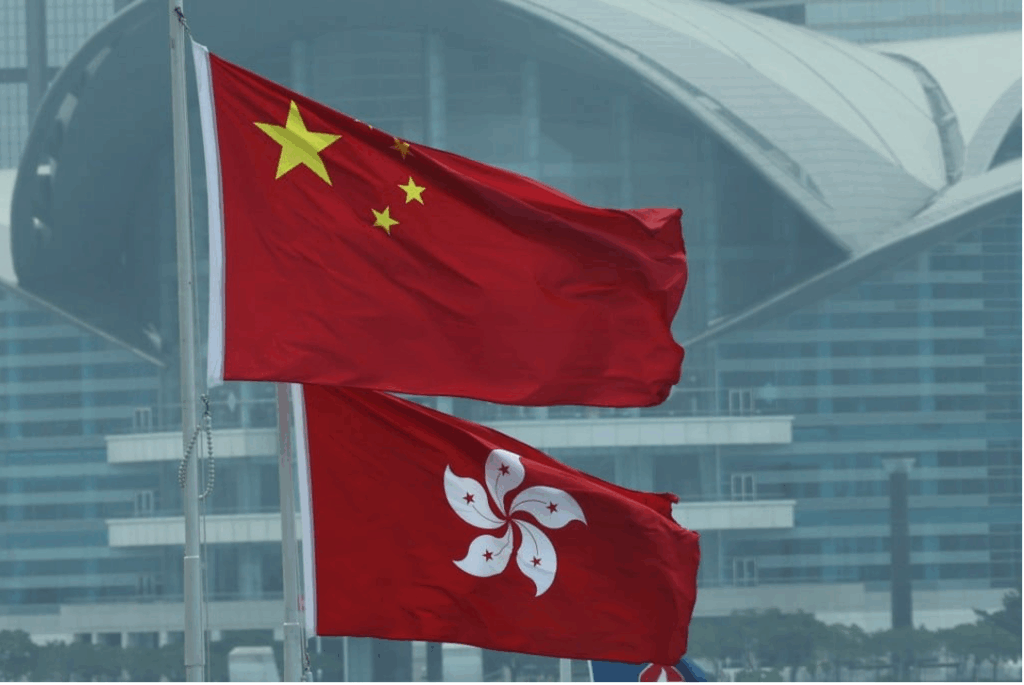
As economic powerhouses in Asia, both mainland China and Hong Kong offer rich opportunities for Belgian companies and investors. The Hong Kong Special Administrative Region (SAR) is a semi-autonomous region of China that operates under the “One Country, Two Systems” framework, allowing it to maintain separate legal, economic, and political systems from mainland China. The two markets are fundamentally different in their legal systems, business environments, and regulatory practices. Understanding these differences is crucial for Belgian companies looking to establish a presence in either region.

The Chinese and HKSAR flag outside the Hong Kong Convention and Exhibition Centre;
Photo credit: Jelly Tse
Legal system and currency
One of the most significant differences lies in the legal systems. Hong Kong retains its common law legal system, inherited from the British colonial era. It is widely regarded for its transparency, independence, and consistency. Contracts and property rights are strictly protected, and international arbitration is common. This legal clarity makes Hong Kong a more familiar and stable environment for Western businesses.
Mainland China operates under a civil law system rooted in socialist law, with strong government involvement and central planning. Regulations are often interpreted flexibly, and enforcement can vary regionally, leading to a less predictable business environment. That said, China’s legal framework has undergone considerable reform over the past two decades, particularly in areas such as contract law, intellectual property protection, and commercial dispute resolution. Specialized courts for intellectual property and commercial cases have been established in major cities, and foreign companies increasingly report more reliable legal enforcement, especially in economically developed regions like Shanghai, Beijing, and Guangdong. While challenges remain—especially around local enforcement and regulatory interpretation—there is no doubt that China’s legal environment has become more professional, transparent, and accessible than it was in the past.

The impressive Hong Kong skyline
Another key difference is currency control. The Chinese yuan (CNY) is subject to strict capital controls, making it difficult to freely move funds in and out of the country. This can create challenges for profit repatriation and foreign exchange transactions. Hong Kong uses the Hong Kong dollar (HKD), which is freely convertible and pegged to the U.S. dollar. There are no restrictions on capital flows, making it a preferred location for banking, finance, and holding companies.
Ease of doing business and taxes
Hong Kong consistently ranks as one of the easiest places in the world to do business. The World Bank and various other institutions refer to its streamlined administrative procedures, low tax rates, and minimal bureaucracy. Registering a company can take just a few days, and the regulatory burden is generally low. In Hong Kong, business practices are more aligned with Western norms. There is a stronger emphasis on contracts, punctuality, and direct communication. While personal relationships are still important, they are generally not as central as in mainland China.
In recent years mainland China has improved significantly in terms of ease of doing business, particularly in major cities like Shanghai and Shenzhen. However, the process remains more complex and time-consuming compared to Hong Kong. Licensing, tax filing, and compliance with local government policies often require more intensive local knowledge and support. Business in mainland China often involves dealing with a complex network of relationships, or guanxi. Trust and long-term relationships still play a major role in negotiations and decision-making.
Hong Kong possesses one of the most business-friendly tax regimes globally. It has a simple and low corporate tax rate—currently 16.5% for corporations—and no value-added tax (VAT), capital gains tax, or withholding tax on dividends. Its territorial tax system means companies are only taxed on income derived from within Hong Kong. China, on the other hand, has a more complex and higher tax structure. The standard corporate income tax rate is 25%, and VAT rates range from 6% to 13%, depending on the industry. In addition, there are local surcharges and administrative fees that can add to the tax burden.
Belgium has signed comprehensive double taxation treaties (DTAs) with both mainland China and Hong Kong, which help prevent the same income from being taxed in both jurisdictions. These agreements typically provide mechanisms for reduced withholding tax rates on dividends, interest, and royalties, and allow for the offsetting of taxes paid abroad against Belgian tax liabilities. While the DTA with mainland China is more extensive and has been in place since 1985 (with updates since), the DTA with Hong Kong—signed in 2003—is also robust and widely used by Belgian companies. These treaties not only reduce tax burdens but also provide greater legal clarity and predictability, making it easier for Belgian firms to structure cross-border investments and operations effectively.
Commercial opportunities
While Hong Kong is a relatively small market in terms of population and geographic size, it remains highly attractive as a test market for new products or services. Its cosmopolitan consumer base, efficient infrastructure, and relatively low regulatory barriers make it an ideal environment to try business models before scaling into larger Asian markets, including mainland China. The ease of doing business, coupled with strong legal protections and minimal restrictions, allows companies to launch and adapt quickly with reduced risk.

While Hong Kong offers an international business environment, it does not provide the same access to China’s vast domestic market as a presence in the mainland itself. Companies that want to manufacture, distribute, or sell goods directly to Chinese consumers often need a wholly foreign-owned enterprise (WFOE) or a joint venture on the mainland. Nevertheless, Hong Kong can still serve as an effective gateway to China. The Closer Economic Partnership Arrangement (CEPA) between Hong Kong and mainland China offers Hong Kong-based companies preferential treatment in certain sectors.
Many international firms use Hong Kong as a regional headquarters or financial hub while running operational subsidiaries in China. In recent years however, policies aimed at attracting foreign investment have made Shanghai increasingly attractive for multinationals looking for a presence in China. While it does not yet match Hong Kong’s legal transparency or capital freedom, Shanghai offers direct proximity to China’s domestic market, and for some firms, that proximity outweighs the advantages traditionally offered by Hong Kong.
Conclusion
Choosing between doing business in China or Hong Kong depends on your company’s goals, risk appetite, and operational needs. If your primary interest is tapping into China’s massive consumer base or manufacturing ecosystem, establishing a presence in the mainland is essential—though it comes with added complexity. If you are seeking legal stability, ease of entry, and a well-established international business environment, Hong Kong remains an attractive destination. By the way, a dual-structure approach—where a Hong Kong entity oversees operations in the mainland—can offer the best of both worlds, combining access to China’s market with the flexibility and efficiency of Hong Kong’s business system.
Please contact the Belgian-Chinese Chamber of Commerce (BCECC) in case you have any questions.
